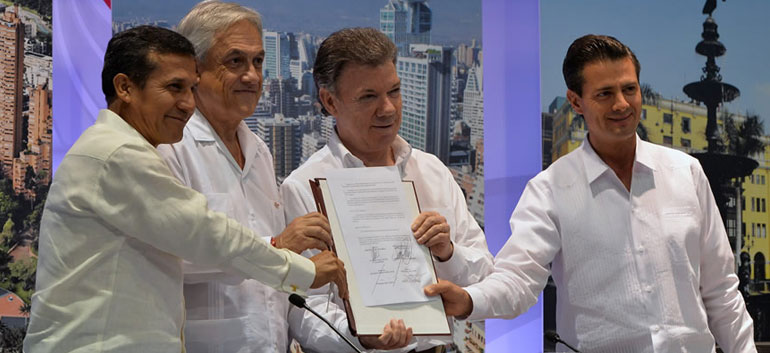The presidents of the four Pacific Alliance (PA) member states signed a commercial agreement on Monday in northern Colombia that will lower tariffs on some 92% of goods imported within the trade bloc, the El Tiempo newspaper reported.
Signed in the Caribbean city of Cartagena, where the PA’s eighth official summit began earlier on Monday, the agreement and additional protocols seek to integrate the economic ties between the four countries with an aim to “increase their competitiveness and create more jobs,” Colombian President Juan Manuel Santos was quoted as saying.
Speaking from the summit, Santos added that the agreement would help give the four countries trade security in the turbulent world economy.
“These four countries of the Alliance are, relatively speaking, better prepared today, and we are protected in the face of the volatility of the markets,” Santos said, citing the relatively high economic growth, low inflation, and high investment that the four countries currently experience.
“This (the agreement) translates into more investment, more competitiveness and as a consequence, more employment, and good quality employment,” President Santos said.
MORE: Pacific Alliance will boost economy and employment: Santos
In addition to signing the agreement, the PA leaders also met with Costa Rican President Laura Chinchilla, who on Monday signed the “Declaration on the intent to the Framework Agreement,” which would pave the way for the country to become a full member state, according to the PA.
Reports also emerged on Tuesday that Israel has been accepted by the PA as an observer state, allowing it to participate in the organization’s top-level work and conferences.
Formed in 2012, the PA has as one of its primary focuses the expansion of the bloc’s economic presence in foreign markets, especially the burgeoning consumer economies of the Asia-Pacific.
Critics such as the Agricultural Society of Colombia (SAC) have opposed the protocol since its initial formation last year, stating that the drop in tariffs between Colombia, Peru, Mexico, and Chile will ultimately have “serious effects” on the country’s agricultural sector.
The SAC has questioned the transparency of trade negotiations and called the Pacific Alliance’s legitimacy. Senator Jorge Armando Robledo is among a small faction of congressmen that has expressed similar indignation over a lack of legislative input into the trade dealings. Robledo went so far as to call the trade pact “treason,” claiming that liberalized trade policies will have a detrimental effect of local economies and Colombia’s national production.
MORE: Prominent Colombian senator calls Pacific Alliance trade pact ‘treason’
Colombian Commerce Minister Santiago Rojas, however, said the negotiations were completely transparent and that the private sector was duly informed of the process, according to El Tiempo.
The agreement and trade protocols, which will still have to go through the political processes of the respective countries before its approval, will likely be put into effect at the end of this year or in the first part of 2015.
In Colombia the protocol has to be approved as law by the Congress and then revised in the Constitutional court.
Sources
- Protocolo adicional de la Alianza del Pacífico permite a nuestras economías ser más competitivas y generar más empleo: Presidente Santos (Presidential Office Press Release)
- Costa Rica to join the Pacific Alliance (PA Press Release)
- La Alianza del Pacífico, ‘el exito de una misma vision’ (El Tiempo)
- Las razones para estar en desacuerdo total con los beneficios que aduce gobierno con Alianza Pacífico (SAC Press Release)
- Israel Accepted as Observer in Latin Pacific Alliance (Arutz Sheva, Israeli National News)



